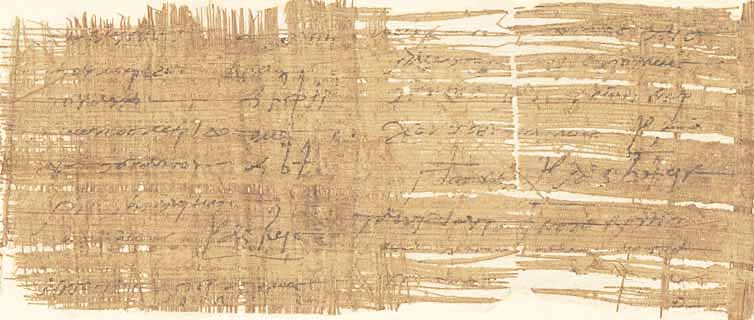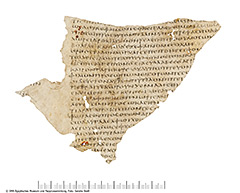BKT V.2, S. 84–87 (P. 5514)
A rarely preserved tragedy by Euripides. Only fragments of this tragedy have survived. In total there are fewer than 10 fragments of this tragedy. On the parchment presented here is the largest coherent piece that we know today.The tragedy: the bound Melanippe.
The parchment was acquired in the Fayum. It is therefore very likely that the piece was also found in the Fayum. It came to the Berlin Papyrus Collection in 1879 and can be seen today in the Neues Museum in Berlin. It is a double sheet from a codex, a pre-form of today’s book, of which larger parts of two pages and remnants of two other pages have been preserved. Since the parchment is very thin, the writing on the other side shines through. Based on the writing and the shape of the letters the parchment can be dated to the 5th century AD.
Remnants of a tragedy by Euripides entitled “The bound Melanippe” have been preserved on this parchment. Euripides, born on the island of Salamis approx. 480 BC, is the youngest of the three great tragedy poets of classical Greece alongside Aeschylus and Sophocles. Only 18 of his 90 dramas were preserved. Many of them have only survived in fragments, in quotations from other ancient authors and from shreds of papyrus and parchment. These include two tragedies that deal with the myth about Melanippe.
Melanippe was the daughter of Aeolus, the ancestor of the Aeolians, who, along with the Dorians and Ionians, were among the most important tribes in ancient Greece. She secretly gave birth to the twins Aeolus and Boeotus, whose father was Poseidon. She hid them from her father in the barn with the cows. But he found them, thought they were monsters and wanted to kill them. To protect her children, Melanippe confessed to be their mother. Then she was locked up by her father. The children were abandoned. Childless Theano, the wife of king Metapontus, found them and passed them off as her own children. When she later had two children of her own, she wanted to get rid of the other, now grown-up twins. But the plan failed and Aeolus and Boeotus found out their true origins and freed their mother.
In the tragedy “The wise Melanippe” Euripides deals with the first part of myth and the rescue of the twins from the father. The tragedy “The bound Melanippe”, of which remains survived on this parchment, is about Theano’s planned but failed murder of the twins and the liberation of Melanippe.
In the text on the parchment presented here a messenger reports who had returned to Theano from the attempted murder of the twins. Aeolus and Boeotus were hunting when they were suddenly ambushed by Theano’s brothers and shot at by them. However, the twins survived this attack and killed the two brothers of Theano, whose escaped servant now reports it.
On the small rest of the fourth page of this parchment one can see an ornament in front of and below a line. It is a coronis that marks the end of this tragedy.
Quotations of this tragedy are preserved in other writers as mentioned above. The papyrus P 9772 contains a long citation in the context of anthology on the topic marriage.



